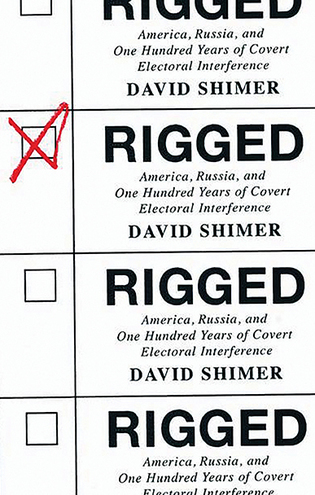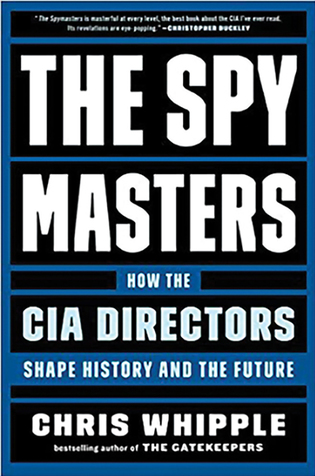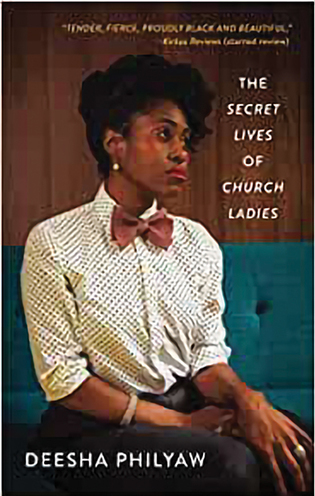
Rigged: America, Russia, and One Hundred Years of Covert Electoral Interference
David Shimer ’18
Penguin Random House, $29.95
Reviewed by David Greenberg ’90
How much did Russian president Vladimir Putin interfere in the 2016 presidential election, and did he actually swing it to Donald Trump? These and related questions have hovered over Trump’s presidency like a malignant cloud. During the 2016 race, Trump memorably encouraged Russia to hack Hillary Clinton’s email; in November 2020 he fired the cybersecurity official tasked with safeguarding the election’s integrity. Now, as Trump departs the White House, he leaves behind festering doubts about the health of our electoral processes and indeed about democracy itself.
Concern about Russian subversion in democratic elections turns out to have a long lineage, as journalist David Shimer ’18 makes clear in his timely new book, Rigged: America, Russia, and One Hundred Years of Covert Electoral Interference. Although Shimer’s history is far from consummate, his backstory nonetheless serves as an important prologue. We learn that Russia was bent on undermining free nations’ elections ever since the Communists’ earliest years in power, and we get some delicious Cold War tales of skullduggery on the part of both superpowers.
It was two newcomers on the scene who turned what had been an intermittently dangerous game into a full-blown crisis: first, Vladimir Putin, who came to power bent on humiliating the United States and the West like no Russian leader in decades; and, second, the internet, which afforded infinite new possibilities for mischief. It is here that Rigged hits its stride. Shimer—relying on original interviews with almost all of the key players—offers a captivating examination of the run-up to 2016, of the Russian interference operations that year, and of the US government’s halting and (in retrospect) inadequate response. Arguments broke out within the administration about how loudly to blow the whistle and how harshly to retaliate against Putin. President Barack Obama and his team chose a circumspect path, with consequences that we now know all too well. Near the book’s end, Shimer quotes a chastened senior official: “Knowing then what we know now, yeah, we should, absolutely should, have done more, faster, harder.” The official? Antony J. Blinken, whom Joe Biden tapped to be his secretary of state.
David Greenberg is a historian at Rutgers University and author of Republic of Spin: An Inside History of the American Presidency.

The Spy Masters: How the CIA Directors Shape History and
the Future
Chris Whipple ’75
Scribner, $30
Reviewed by Alex Beam ’75
If cloak and dagger is your thing—and the many readers of Yale history professor Robin Winks’s classic Cloak and Gown: Scholars in the Secret War, 1939–1961 know that Yale and spying have a long and hallowed tradition—Spy Masters, by Chris Whipple, will sate your craving. Written as a follow-up to his 2015 Showtime documentary, The Spymasters: CIA in the Crosshairs, this book is part oral history and part old-fashioned storytelling, based on interviews with dozens of CIA directors and their aides.
The payoff is rich, in small tidbits and new revelations. Tidbit: William Casey was a very popular CIA director and an inveterate slob who wiped his mouth with his necktie while hurrying through meals. Revelations: Whipple reveals that when Vietnam-era Defense Secretary Robert McNamara discovered CIA director Richard Helms’s famous Vietnam “dissent memo” in the archives of the Lyndon Johnson Library, he screamed over the phone to Helms’s widow, Cynthia: “Why wasn’t I shown this? This would have helped me!”
Spy Masters also tells the story of “Alec Station,” a mostly female, ad hoc CIA office created to monitor emerging terror threat Osama bin Laden. (The station was named after the boss’s son.) It was mostly female because, in 1991, chasing bin Laden was deemed to be a career-stalling backwater. “It was a sisterhood that would ultimately lead us to Abbottabad”—where bin Laden was killed—CIA director Michael Hayden comments. “They were chasing bin Laden before chasing bin Laden was cool.” One analyst compared bin Laden, the scion of a wealthy Saudi Arabian family, to a famous American playboy-plutocrat of the 1990s: “Osama bin Laden was like the Donald Trump of the terrorism underworld.”
The CIA has committed its fair share of blunders, and Whipple generally doesn’t sugar-coat them. Institutional homogeneity (“white, male, and Yale”) blinded the agency to some spectacular penetrations by double agents. Perhaps its most egregious intelligence failure was director George Tenet’s assertion that Iraq’s possession of weapons of mass destruction was a “slam dunk,” an erroneous finding that had fateful consequences. Whipple also reminds us that during the summer of 2001, a special CIA team warned the George W. Bush administration of an imminent attack on US soil. “The trouble was,” he writes, “their warning had not been heard.”
Alex Beam is the author of Broken Glass, a book about Mies van der Rohe’s Farnsworth House.

The Secret Lives of Church Ladies
Deesha Philyaw ’93
West Virginia University Press, $18.99
Reviewed by Sylvia Brownrigg ’86
It is interesting to track the relationship between a writer’s journalistic and fiction-writing personae: they may seem like kin, or a fictional outing may open a writer to imaginative flight, as Ta-Nehisi Coates’s Water Dancer took off from the powerful, grounded arguments of his Atlantic essays. The author Deesha Philyaw ’93, who has written for the New York Times and elsewhere about issues to do with adoption, stepparenting, and post-divorce co-parenting, follows more of Coates’s liberating path in her vibrant, enticing book of short stories, The Secret Lives of Church Ladies. Philyaw is brilliantly free here from constraints of tact or propriety.
In brief: these ladies’ secret lives involve quite a lot of illicit sex. And painful, loving mother-daughter relations, as different generations consider their church, its values, and even its conception of God. One fraught story of a girl who grows up knowing of her mother’s weekly assignation with their pastor begins, “My mother’s peach cobbler was so good, it made God himself cheat on his wife.” It takes the little girl some years to differentiate between the pastor they listen to every Sunday in church and the God he invokes from the pulpit, partly because of what the girl hears her mother crying out from behind the closed bedroom door at home.
There is lively comedy, too, in the conversations among these Black sisters and Black friends and Black lovers. A feeling of community binds these women together, the virgins and girlfriends and matriarchs—a community whose church is often a (complicated) touchstone.
Sylvia Brownrigg’s novels Pages for You and Pages for Her are now available in paperback.
 loading
loading

